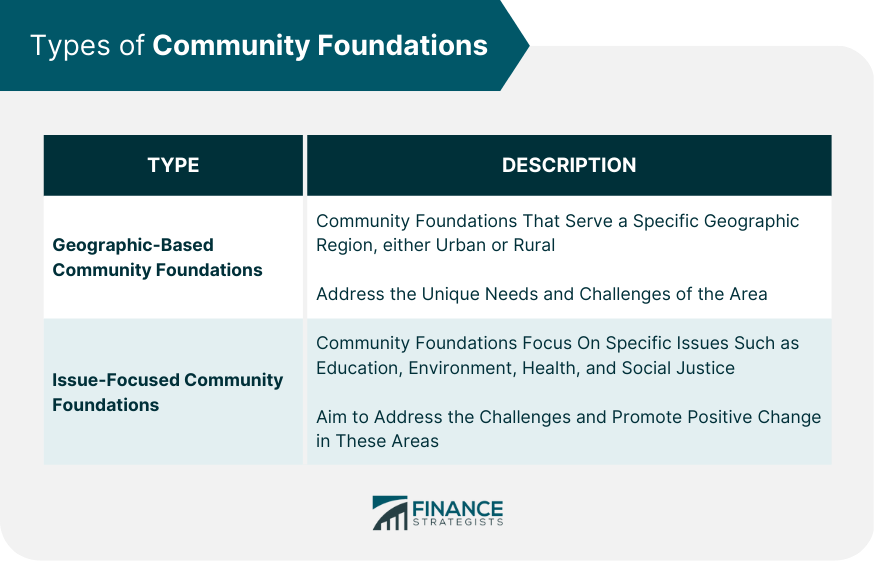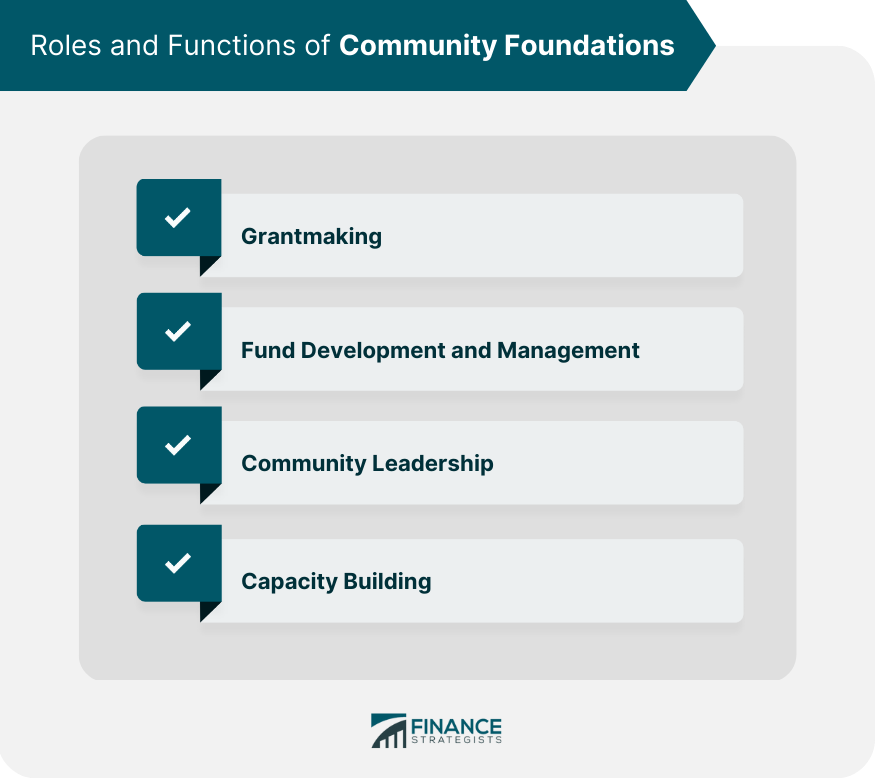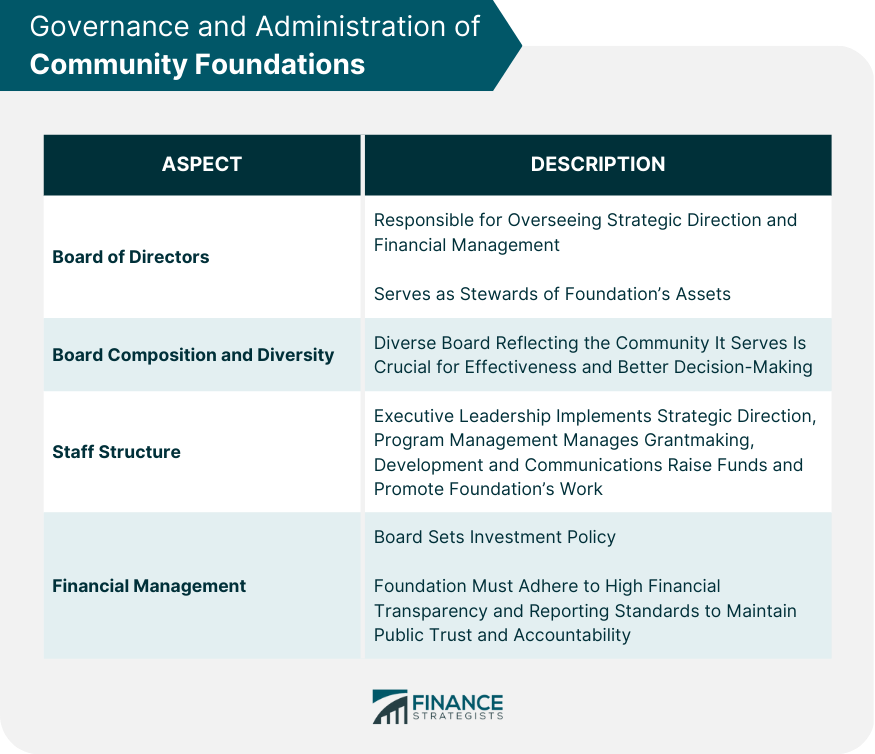Community foundations play a vital role in local communities by providing financial support and leadership to address pressing issues. As nonprofit organizations, community foundations pool and manage funds from individual donors, businesses, and other sources to make a lasting impact on the lives of community members. Urban community foundations typically serve densely populated metropolitan areas, addressing a wide range of issues, such as affordable housing, economic development, and public education. These foundations work closely with local government, nonprofits, and other stakeholders to implement programs and initiatives that improve the quality of life for urban residents. Rural community foundations cater to the unique needs and challenges faced by communities in less populated areas. They often focus on issues such as agriculture, rural healthcare, and access to education. Rural community foundations play a critical role in supporting small towns and villages, ensuring they have the resources to thrive and grow. Education-focused community foundations aim to improve educational outcomes and opportunities for students of all ages. They may support initiatives such as early childhood education programs, after-school activities, teacher training, and scholarships for higher education. Community foundations with an environmental focus work to preserve and protect natural resources while promoting sustainable practices. They may fund conservation, pollution reduction, and climate change mitigation projects, as well as support environmental education and advocacy efforts. Health-focused community foundations address a range of health-related issues, from access to healthcare services to prevention and wellness programs. They may also provide support for research, policy development, and community-based health initiatives. Social justice community foundations work to promote equity and inclusion in their communities. They often fund programs and initiatives that address systemic issues such as poverty, racism, and gender discrimination. Community foundations distribute grants to nonprofits and other organizations through a competitive application process. These grants are typically awarded based on factors such as alignment with the foundation's mission, demonstrated need, and potential for impact. Donor-advised grants allow individual donors to recommend specific organizations or projects for funding. Community foundations manage the funds and facilitate the grantmaking process, ensuring that the donor's recommendations align with the foundation's overall mission and goals. Endowments provide a long-term source of funding for community foundations. Donors contribute to an endowment fund, and the foundation invests the principal to generate income. The foundation then uses the investment returns to support grantmaking and other initiatives. Community foundations manage donor-advised funds on behalf of individual donors, families, or businesses. These funds allow donors to make tax-deductible contributions and recommend grants to organizations of their choice while the foundation handles the administrative and investment aspects. Community foundations often act as conveners, bringing together diverse stakeholders to address community issues. They may organize forums, workshops, or other events that foster collaboration and collective problem-solving. Some community foundations engage in advocacy and policy work to influence local, regional, or national decision-making processes. They may develop research reports, policy briefs, or other materials to inform and influence policymakers and stakeholders. Community foundations often provide training and resources to strengthen the capacity of local nonprofit organizations. They may offer workshops on topics such as fundraising, board development, and strategic planning, as well as provide access to research, data, and best practices to help nonprofits improve their effectiveness and sustainability. Community foundations may facilitate collaboration and partnerships among nonprofits, businesses, government agencies, and other stakeholders. By fostering these relationships, foundations can help create synergies that maximize resources and significantly impact the community. The board of directors is responsible for overseeing a community foundation's strategic direction and financial management. Board members serve as stewards of the foundation's assets, ensuring that funds are managed responsibly and used to advance the foundation's mission. A diverse board that reflects the community it serves is crucial for a community foundation's effectiveness. By including members with different backgrounds, experiences, and perspectives, the board can make better decisions and more effectively address the needs of the community. The executive leadership of a community foundation is responsible for implementing the board's strategic direction and managing the organization's day-to-day operations. The chief executive officer (CEO) or president is the foundation's primary representative to the community, donors, and other stakeholders. The program staff is responsible for managing the foundation's grantmaking and community initiatives. They work closely with grantees, donors, and other stakeholders to ensure that funded programs align with the foundation's mission and positively impact the community. Development and communications staff are responsible for raising funds and promoting the foundation's work. They cultivate relationships with donors, manage fundraising events, and create marketing materials and public relations campaigns that raise awareness about the foundation's impact. Community foundations invest their assets to generate income for grantmaking and other initiatives. The board of directors typically sets the foundation's investment policy, which outlines the foundation's investment objectives, asset allocation, and risk tolerance. To maintain public trust and accountability, community foundations must adhere to high financial transparency and reporting standards. They are required to submit annual financial statements, undergo independent audits, and make their financial information available to the public. As communities evolve and face new challenges, community foundations must adapt their strategies and priorities accordingly. They must continually assess the needs of their communities, engage with diverse stakeholders, and develop innovative solutions to address emerging issues. Community foundations must engage with a wide range of donors and stakeholders to build a broad base of support. They must be responsive to the interests and needs of their donors, while also remaining focused on their mission and community priorities. Technology offers new opportunities for community foundations to enhance their work and increase their impact. Community foundations can streamline their operations, expand their reach, and better serve their communities by adopting digital tools and platforms for fundraising, grantmaking, and collaboration. Community foundations play a vital role in addressing the unique needs of local communities by providing financial support, leadership, and capacity-building resources. As they continue to evolve and adapt to changing community needs, they hold the potential to create lasting, positive change. Consider seeking professional tax planning services to maximize the benefits of your charitable contributions to community foundations. Tax planning experts can help you strategically structure your giving to ensure you receive the most significant tax advantages while making a meaningful impact on the causes you care about. The future of community foundations is promising as they continue to innovate and leverage new opportunities to enhance their impact and better serve the communities they represent. By engaging with community foundations and utilizing tax planning services, you can become an active participant in creating a brighter future for your community.What Are Community Foundations?
Types of Community Foundations

Geographic-Based Community Foundations
Urban Community Foundations
Rural Community Foundations
Issue-Focused Community Foundations
Education
Environment
Health
Social Justice
Roles and Functions of Community Foundations

Grantmaking
Competitive Grants
Donor-Advised Grants
Fund Development and Management
Establishing Endowments
Managing Donor-Advised Funds
Community Leadership
Convening Stakeholders
Advocacy and Policy Work
Capacity Building
Training and Resources for Local Nonprofits
Supporting Collaboration and Partnerships
Governance and Administration of Community Foundations
Board of Directors
Roles and Responsibilities
Board Composition and Diversity
Staff Structure
Executive Leadership
Program Management
Development and Communications
Financial Management
Investment Strategies
Financial Transparency and Reporting

Challenges and Opportunities for Community Foundations
Adapting to Changing Community Needs
Engaging Diverse Donors and Stakeholders
Leveraging Technology for Greater Impact
Final Thoughts
Community Foundations FAQs
Community foundations are nonprofit organizations that pool and manage funds from individual donors, businesses, and other sources to support local communities. They play a crucial role in addressing pressing issues and improving the quality of life for community members by providing financial support, leadership, and capacity-building resources.
Community foundations can be categorized based on their geographic focus (urban or rural) or issue focus (education, environment, health, or social justice). These distinctions allow community foundations to tailor their strategies and initiatives to address their specific communities' unique needs and challenges or target issues.
Community foundations serve several key roles and functions, including grantmaking, fund development and management, community leadership, and capacity building. They distribute grants to nonprofits, manage endowments and donor-advised funds, convene stakeholders, engage in advocacy and policy work, and provide training and resources for local nonprofit organizations.
Community foundations are governed by a board of directors responsible for overseeing their strategic direction and financial management. A diverse and representative board composition is essential for effective decision-making. Community foundations also maintain a staff structure that includes executive leadership, program management, and development and communications teams. To ensure transparency and accountability, they adhere to high standards of financial reporting and undergo independent audits.
Community foundations face challenges such as adapting to changing community needs, engaging diverse donors and stakeholders, and leveraging technology for greater impact. However, these challenges also present opportunities for innovation, collaboration, and growth, enabling community foundations to continue making a lasting, positive impact on the communities they serve.
True Tamplin is a published author, public speaker, CEO of UpDigital, and founder of Finance Strategists.
True is a Certified Educator in Personal Finance (CEPF®), author of The Handy Financial Ratios Guide, a member of the Society for Advancing Business Editing and Writing, contributes to his financial education site, Finance Strategists, and has spoken to various financial communities such as the CFA Institute, as well as university students like his Alma mater, Biola University, where he received a bachelor of science in business and data analytics.
To learn more about True, visit his personal website or view his author profiles on Amazon, Nasdaq and Forbes.















